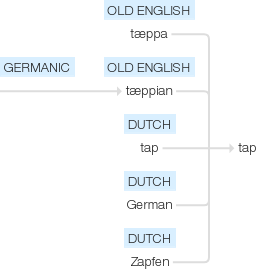Tap
Old English tæppa ‘peg for the vent-hole of a cask’, tæppian ‘provide (a cask) with a stopper’, of Germanic origin; related to Dutch tap and GermanZapfen (nouns).
wiktionary
From Middle English tappe, from Old English tæppa, from Proto-Germanic *tappô. The verb is from Middle English tappen, from Old English tæppian, from Proto-Germanic *tappōną, from the noun.
From Middle English tappen, teppen, from Old French tapper, taper(“to tap”), of Germanic origin, from Frankish *tappōn, *dabbōn(“to strike”) or from Middle Low German tappen, tapen("to tap, rap, strike"); both ultimately from Proto-Germanic *dab-(“to strike”), from Proto-Indo-European *dʰAbʰ-(“to beat, strike, stun, be speechless”). Related to German tappen(“to grope, fumble”), Icelandic tappa, tapsa, tæpta(“to tap”). Related to dab.
Hindi[Term?]
etymonline
tap (v.1)
"strike lightly," c. 1200, from Old French taper "tap, rap, strike" (12c.), from a Gallo-Roman or Germanic source ultimately imitative of the sound of rapping. Meaning "to designate for some duty or for membership" is recorded from 1952, from notion of a tap on the shoulder. Related: Tapped; tapping.
tap (n.1)
"stopper, faucet through which liquid can be drawn," Old English tæppa "tap, spigot," from Proto-Germanic *tappon (source also of Middle Dutch tappe, Dutch tap, Old High German zapfo, German Zapfe). Originally a tapering cylindrical peg for a cask, then a hollowed one to draw from it (compare sense evolution of spigot). Phrase on tap "ready for use, ready to be drawn and served" is recorded from late 15c. Tap-wrench, used in turning one, attested from 1815.
tap (v.2)
"to supply with a tap," late Old English tæppian, from source of tap (n.1); compare German zapfen "to tap." Meaning "to draw liquor with a tap" is from mid-15c. Extended sense "make use of" is first recorded 1570s. Meaning "listen in secretly" (1869), originally was with reference to telegraph wires. Tapped out "broke" is 1940s slang, perhaps from the notion of having tapped all one's acquaintances for loans already (compare British slang on the tap "begging, making requests for loans," 1932).
tap (n.2)
"light blow or stroke," mid-14c., from tap (v.1). Tap dancer first recorded 1927, from tap (n.) in the sense of "metal plate over the heel of a shoe" (1680s).
tap (n.3)
"device to listen in secretly on telephone calls," 1923, from tap (v.2) in the "listen secretly" sense.
